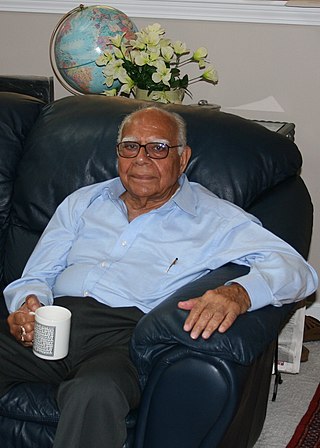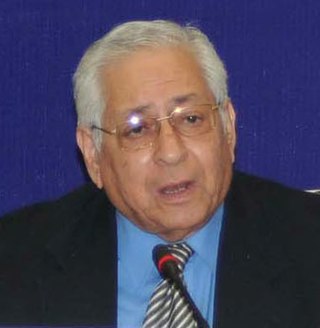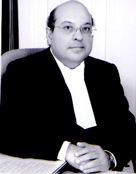
National Human Rights Commission of India is a statutory body constituted on 12 October 1993 under the Protection of Human Rights Ordinance of 28 September 1993. It was given a statutory basis by the Protection of Human Rights Act, 1993 (PHRA). The NHRC is responsible for the protection and promotion of human rights, which is defined by the act as "rights relating to life, liberty, equality and dignity of the individual guaranteed by the Constitution or embodied in the International Covenants and enforceable by courts in India".

Ram Boolchand Jethmalani was an Indian lawyer and politician. He served as India's Union Minister of Law and Justice, as chairman of the Indian Bar Council, and as the president of the Supreme Court Bar Association.
Vithal Mahadeo Tarkunde, was a prominent Indian lawyer, civil rights activist, and humanist leader and has been referred to as the "Father of the Civil Liberties movement" in India and a former judge of the Bombay High Court The Supreme Court of India also praised him as "undoubtedly the most distinguished judge of the post-Chagla 1957 period" in the Bombay High Court.

Soli Jehangir Sorabjee, AM was an Indian jurist who served as Attorney-General for India from 1989 to 1990, and again from 1998 to 2004. In 2002, he received the Padma Vibhushan for his defence of the freedom of expression and the protection of human rights.

Laxmi Mall Singhvi was an Indian jurist, parliamentarian, scholar, writer and diplomat. He was, after V. K. Krishna Menon, the second-longest-serving High Commissioner for India in the United Kingdom (1991–97). He was conferred with a Padma Bhushan in 1998.
The Gruber Prize for Justice, established in 2001, was one of five international prizes worth US$500,000 awarded by The Peter and Patricia Gruber Foundation, an American non-profit organization.

Shanti Bhushan was an Indian politician and lawyer. He served as the Law Minister of India holding office at the Ministry of Law and Justice from 1977 to 1979 in the Morarji Desai Ministry. He was a senior advocate of the Supreme Court of India. He, along with his son Prashant Bhushan, was featured at 74th position in a list of the most powerful Indians published by The Indian Express in 2009.

Anu Aga is an Indian billionaire businesswoman and social worker who led Thermax, an energy and environment engineering business, as its chairperson from 1996 to 2004. She was among the eight richest Indian women, and in 2007 was part of 40 richest Indians by net worth according to Forbes magazine. She was awarded with the Mumbai Women of the Decade Achievers Award by ALL Ladies League, the all ladies wing of ASSOCHAM.
Goolamhussein Essaji Vahanvati (1949-2014) was an Indian senior counsel who served as the 11th Attorney General for India. His first term in office began in June 2009 and was for three years.
Gopal Subramanium is an Indian lawyer, international arbitrator, academic and Senior Advocate who practices primarily in the Supreme Court of India and the Delhi High Court. He served as the Solicitor General of India 2009–2011 and Additional Solicitor General of India 2005–2009. He served as Chairman of the Bar Council of India 2010–2011.
Keshava Parasaran is a lawyer from India. He was Advocate General of Tamil Nadu during the president's rule in 1976, Solicitor General of India under the then Prime Minister Indira Gandhi, and Attorney General of India under Prime Ministers Indira Gandhi and Rajiv Gandhi between 1983 and 1989 until the end of Rajiv's tenure. Parasaran was awarded the Padma Bhushan in the year 2003 and Padma Vibhushan in the year 2011. In June 2012, he received a presidential nomination to the Rajya Sabha, the upper house of India's parliament, for a period of six years. He is a member of Shri Ram Janmabhoomi Teerth Kshetra. In 2019 the Central Government appointed him to lead the Shri Ram Janmabhoomi Teerth Kshetra. However later, Mahant Nritya Gopal Das was appointed to lead the trust. The trust oversaw the construction of the Ram Temple in Ayodhya.
Soumitra Sen is a former judge of the Calcutta High Court. He was the first judge in independent India whose removal motion was passed in Rajya Sabha for misappropriation of funds.

Rohinton Fali Nariman is a former judge of the Supreme Court of India. Before being elevated as a judge, he practised as a senior counsel at the Supreme Court. He was appointed the Solicitor General of India on 23 July 2011. He also served as a member of the Bar Council of India. He was designated as a Senior Counsel by Chief Justice Manepalli Narayana Rao Venkatachaliah in 1993 at the early age of 37.
The Committee on Judicial Accountability and Judicial Reforms (CJAR) is a group of lawyers in India who work to improve the accountability of judges.
Chander Kishan Daphtary was an Indian lawyer and was the first Solicitor General of India from 1950 to 1963. He was the Attorney General for India from 1963 to 1968. He was the President of the Bar Association of India. He was nominated to the Rajya Sabha the Upper House of Indian Parliament from 1972 to 1978. He was awarded the Padma Vibhushan in 1967.

Ranjan Gogoi is an Indian former advocate and judge who served as the 46th Chief Justice of India from 2018 to 2019, having previously served as a Judge of the Supreme Court of India from 2012 to 2018. He is currently a Member of the Rajya Sabha, having been nominated by President Ram Nath Kovind on 16 March 2020. Gogoi served as a judge in the Gauhati High Court from 2001 to 2010, and then was transferred as a judge to the Punjab and Haryana High Court from 2010 to 2011 where he later was the Chief Justice from 2011 to 2012. He is also a member of the Committee on External Affairs in the Rajya Sabha.








